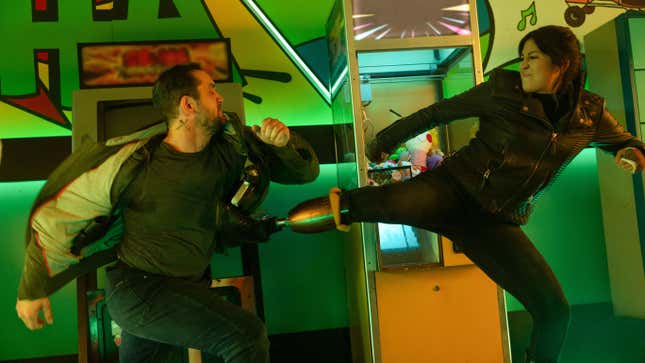
The groundbreaking Marvel Spotlight miniseries Echo, which debuted earlier this month on Disney+ and Hulu, centers around Maya Lopez, a Deaf Choctaw superhero. However, as many fans know, this series isn’t the first time Marvel has introduced a Deaf or disabled character. There’s Daredevil, who is Blind (a character Echo faces in this show—we’ll get to that); Makkari of the Eternals, who is Deaf; and Hawkeye, the star of the series in which Echo first debuted, who is hard of hearing. Stretch your brain just a little, and you see that even some of the MCU’s straight-up superhero’s superpowers can be disabling. Hulk, for one, comes to mind. Sure he could get super big and strong (and green) on a dime, but at the expense of some cognitive function accompanied by serious impulse control issues. He had to work hard to learn how to accommodate himself so that he wouldn’t be “Hulking out” and wrecking shit all over Avengers HQ and the world.
And as we would hope with a brand-new show, Marvel’s Echo does some pretty cool things that Marvel hadn’t done before. It takes all the lessons learned from past efforts at portraying disability—as well as its Deaf/Hard of Hearing consultant Douglas Ridloff, husband to Lauren Ridloff, who played Makkari—and breaks new ground in a variety of ways while staying true to the story. Here are a few of them.
Echo portrays being Deaf as both disabling and a sort of superpower
Maya is never jumpy around loud noises, as others often are. She can be in the middle of a shrieking, violent dust-up, but aware of only the thud of her own blood rushing through her veins. She can send a motorcycle soaring through a store window, without recoiling from the crash at all, with a sort of turn-and-walk-from-the-explosion kind of energy. Unfortunately, this also means people can sneak up on her. She has to rely on visual cues (for instance, a shadow crossing past her front window) to indicate that someone might be at her house trying to get her. At the powwow in the final episode, we dip into her perspective to see her struggling to discern the beat and fall in step with the music. We see her clear discomfort as she attempts to mimic the moves of the dancers around her to blend in. In flashback, we also see her as a child attempting to order from an NYC hot-dog truck in ASL (American Sign Language), only to be bullied by a grown adult—told “use your words” as he waved his hands around mockingly. Echo’s is not a simplified, rosy portrait of disability; it acknowledges the complexity of it.

The series normalizes the use of accommodations the hearing world may not recognize
Did you know that there are devices that can detect motion at the door, triggering lights to flash to alert people who can’t hear a knock or doorbell? Well, you’ll see one used in Echo. The show cuts to the light flashing, just to show what’s going on, but otherwise treats it as a pretty normal thing. You’ll also see some fantastical contact lenses poked into Maya’s eyes that allow Kingpin’s words to be translated into some line-drawn, animated arms that simultaneously sign his words in front of his body as an earbud component feeds him her ASL responses as verbal speech. But those don’t exist yet. Still, imagining technologies that could evolve to make the world more accessible for DHH folks is a worthy endeavor and cool to see represented in television.
Echo shows a heck of a lot of ASL
Maya is very much the main character of this miniseries, and she uses ASL to communicate. Ergo, any conversation she has is either via text messages, which are shown on screen (much more accessible than verbal speech), or manual signs. This means viewers get a ton of exposure to the language, whether they use it themselves and it aids their understanding of the show or they’re curious about it and maybe even want to learn a phrase or two—like “Thank you, Uncle,” or “All I bring is danger.” “Need” is a pretty basic one that we didn’t know, until we saw Maya use it, so thanks, Echo. (Yeah, our ASL is very rudimentary—don’t make fun of us.)
Maya’s disability is crucial to the storytelling, not an afterthought or novelty
Characters’ commitments to communicating with Maya gives us insight into the quality of her connections to others. Those contact lenses mentioned earlier? They show Maya, clearly, that Kingpin doesn’t value her. Her family, on the other hand—her parents, grandparents, cousin, and closest friends—all became fluent in ASL, first for Maya’s mother and then for her. Her cousin and grandfather have even found a practical use for it, in the store they own and operate, to communicate behind customers’ backs.
Her disability also raises the stakes in conflict in ways that are organic to the character. When her hands are tied behind her back, stripping her of her mode of communication, our hearts drop. When she encounters Daredevil in combat, a Blind superhero who can’t see her sign, even if he could understand ASL, we fear for her all the more. Her metal prosthetic leg can get smashed by a train coupler as she’s planting a bomb, but that only gives us a nice opportunity to see her grandfather forge her a new, more meaningful one.
Keeping in mind that Echo is still a show primarily oriented toward a hearing audience, it does an amazing job at representation for something so mainstream. There have been some critics of the show who have not responded well to its inclusion efforts (as usual), but Marvel and the normies will continue to grow their relationship. And it’s frankly exciting to think of what Echo’s example can do for future portrayals of disability in popular entertainment.